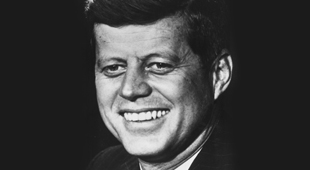
Kennedy's appointment as US president in 1961 heralded a new era in the Cold War. Of a younger generation, he came to office with a 'policy of peace', aiming to slow down the nuclear arms race. However, this did not happen, as it was believed that the USSR had more intercontinental ballistic missiles than the USA.
Kennedy initially increased spending on weapons from $45 billion to $52 billion. His presidency was defined by the Cuban Missile Crisis, where he was praised for standing up to Khrushchev and the Communist threat, largely acting against the advice of his military advisors, who wished to take military action.
Kennedy also continued to hold on to the rights of the West in Berlin, saying in July 1961: "We cannot and will not permit the Communists to drive us out of Berlin." He did not advocate reuniting the city because that could concede Berlin to the Russians.
At the height of the Cold War, Kennedy was assassinated on 22 November 1963. Controversy still surrounds the identity and motives of his assassin.

